| Good morning, it's Tuesday. We have what you need to know about last night's explosive Politico report. What's next? Send us tips at rachel.roubein@washpost.com. Today's edition: A look at charts detailing what could happen in the states if Roe is overturned. And there's more backlash to the federal Medicare agency's decision to limit coverage for an Alzheimer's drug to those in clinical trials. But first … | Nearly half the states could soon ban or limit abortion, if leaked SCOTUS draft stands |  Demonstrators outside the U.S. Supreme Court early on Tuesday morning. Photographer: Ting Shen/Bloomberg | | | The notion that Roe v. Wade could be overturned just got very real. Abortion could soon become banned or closely restricted in nearly half of U.S. states if a Supreme Court decision leaked last night by Politico stands, rewarding antiabortion activists for decades of concerted efforts to overturn the court's 1973 decision legalizing abortion and throwing abortion rights defenders into panic mode. Until the last 12 hours, the issue was largely lurking in the background of the midterms, overshadowed by other key issues, like the economy and voting policies. But Politico's bombshell report catapults abortion to the forefront of voters' and politicians' minds. | - Late yesterday, the media outlet reported that a majority of the Supreme Court is prepared to overturn the right to an abortion established nearly a half-century ago, citing a leaked draft of an initial majority opinion. The news reverberated across Washington and the nation with Congress' top Democratic leaders issuing a blistering rebuke of the draft and of several conservative justices who reportedly voted to overturn the precedent.
| | This could foreshadow the most consequential moment for access to abortion in decades. In the landmark Roe ruling, the Supreme Court declared a woman's constitutional right to terminate pregnancy up until the point of viability, typically between 22 and 24 weeks. Overturning Roe would lead to a seismic shift in how early in pregnancy states can ban abortions, leaving access to the procedure dependent on where a woman lives or whether she has the means to travel across state lines. | - The leaked document "may activate the base in a way that they haven't been activated before because I think it was very hard for people to imagine overturning Roe v. Wade," Alina Salganicoff, a senior vice president of the Kaiser Family Foundation, told The Health 202.
| | House Speaker Nancy Pelosi (D-Calif.): | 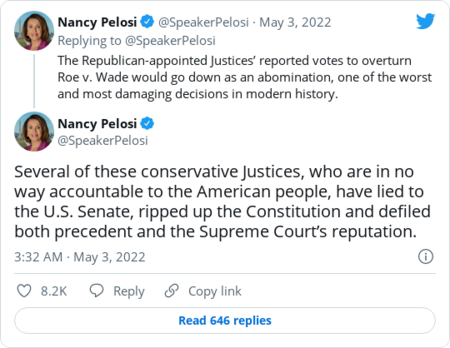 | | | | | Here's what you need to know: | | 1) It's still not clear whether the justices will ultimately ditch Roe. The leaked document was circulated to justices in February, Politico reports, and it could be weeks to months before it's clear whether the draft serves as the underpinnings for the court's decision or was the first salvo in a negotiation. "Drafts of opinions are circulated to try to convince other justices and to serve as a document they can endorse," our colleagues Robert Barnes and Mike DeBonis report. "Language can be strengthened or toned down." The leak was an "extreme breach" of modern Supreme Court protocol, but there was no reason to believe the document Politico obtained was illegitimate. 2) All three of former President Donald Trump's nominees reportedly voted to overturn the precedent. Back in December, the Supreme Court heard oral arguments in Mississippi's case banning most abortions after 15 weeks. After oral arguments, Politico reports that five justices voted to strike down Roe: Justices Samuel A. Alito Jr., Clarence Thomas, Neil M. Gorsuch, Brett M. Kavanaugh and Amy Coney Barrett. (Expect to see these comments from Sen. Susan Collins (R-Maine) insisting Kavanaugh had told her Roe v. Wade was settled law to resurface this week.) | | SCOTUSblog: |  | | | | | 1) Democrats and abortion rights supporters immediately pounced on the draft opinion. They argued the news should serve as a strong motivator for voters and donors to help elect Democrats. "Now more than ever, we must support those working to provide abortion care and elect champions who will relentlessly fight for reproductive freedom and take bold action to safeguard abortion rights," Mini Timmaraju, president of NARAL Pro-Choice America, said in a statement. | | Hundreds of people gathered in front of the Supreme Court last night in a tense scene. Our colleagues Joe Heim and Katy Burnell Evans report that about a dozen antiabortion protesters chanting, "Pro-choice, that's a lie. Babies never choose to die," while a larger group of abortion rights supporters called out, "When abortion rights are under attack, what do we do? Stand up, fight back!" and "Abortion is health care!" "Just after 12:15 a.m. Tuesday, some of the protesters scuffled briefly and a number of masked protesters tried to force antiabortion demonstrators to move away from the front of the court building," they write. "Neither group budged, but the screaming and yelling continued. One antiabortion supporter had their sign taken. Some organizers wearing yellow vests tried to keep the peace. The visible police presence remained minimal." | | Adam Jentleson, a former top Democratic Senate aide: | 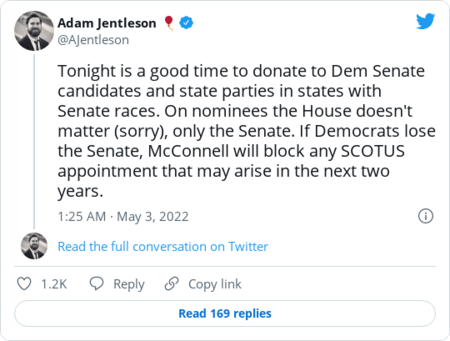 | | | | | 2) The reaction on the right was different. Republicans' comments were more subdued, with "a mix of disdain for the unprecedented leak" and cautious hope that they could achieve a victory they've been working toward for years, Robert and Mike note. Some even publicly portrayed the leak as an attempt to intimidate the justices into changing their position — even without evidence about what motivated the leaker. | | Conservative legal expert and writer David French: | 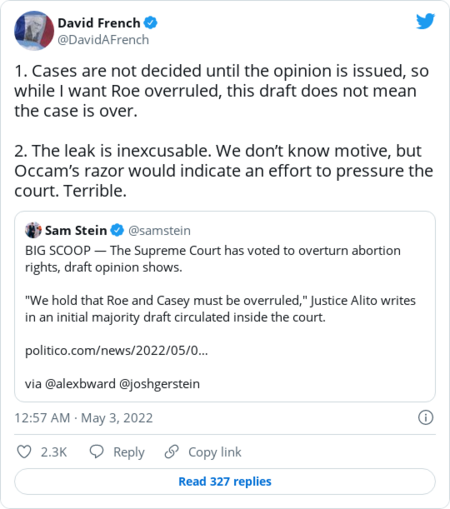 | | | | | 1) The Senate doesn't have the votes to codify Roe — though the draft is certain to put pressure on lawmakers to try again. The Politico report sparked calls from some on the left to pass legislation protecting abortion rights. But there's not much Congress can do here unless it eliminates the filibuster, which would be a deeply divisive move and still Democrats would likely not have the required votes unless they get some GOP moderates on board. A measure to enshrine the right to an abortion into federal law passed the House last year. But the Senate blocked consideration of the measure in February, with all Republicans and Sen. Joe Manchin (D-W.Va.) voting against advancing the measure. 2) States have been furiously preparing for the possibility of a future without Roe. Lawmakers have filed dozens of bills during this year's legislative sessions, as Republican-led states move to restrict the procedure and Democratic-led states attempt to shore up protections. The draft could put renewed energy behind these efforts. | | Bloomberg's Steven Dennis: | 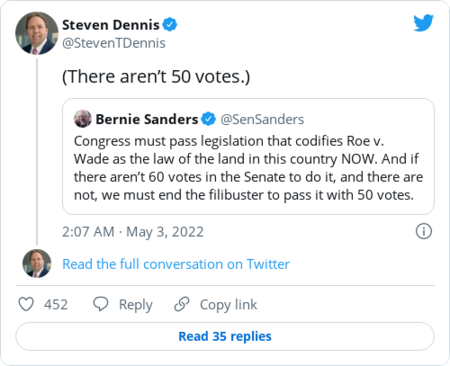 | | | | | Gov. Kristi Noem (R-S.D.): | 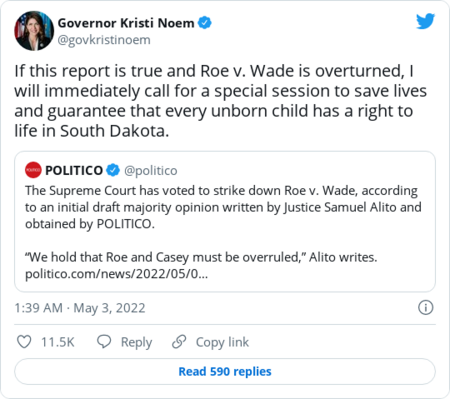 | | | | Here's more coverage from our Post colleagues: | | "Advocates on both sides of the abortion debate reacted Monday night with shock and emotion," Caroline Kitchener writes. "While many expected the Supreme Court to roll back the long-standing precedent in the next few months, most were blindsided by Politico's leak of the draft decision, nearly unprecedented for the high court….Abortion opponents, meanwhile, were jubilant, celebrating the draft as a decisive victory after a 50-year fight to overturn the long-standing precedent." "The result in Roe v. Wade itself was leaked by a Supreme Court clerk to a Time magazine reporter in January 1973," James D. Robenalt writes. "The issue of Time, with an article titled 'The Sexes: Abortion on Demand,' appeared on newsstands hours before the decision was announced by Justice Harry Blackmun." "What the Supreme Court justices have said about abortion and Roe v. Wade," from Robert Barnes and Shelly Tan. | | |  | Chart check | | | If Roe is overturned, states are key to watch here. The legality of when to permit abortion will be left up to individual states. What we know: A dozen states already had "trigger laws" on the books before this year's legislative sessions. These laws are complete bans on abortion at any point in pregancy, and would be "triggered" if Roe is overturned. Meanwhile, Democratic led-states are moving to protect the right to an abortion. | | |  | Industry Rx | | UnitedHealthcare restricts Aduhelm coverage | | The largest private carrier of Medicare Advantage plans will require prior approval starting June 1 for Alzheimer's patients to use the expensive and controversial drug, Stat News's Bob Herman reports. Patients must also be in an approved clinical trial. | - According to the company's new policy, the drug "is unproven and not medically necessary for the treatment of Alzheimer's disease due to insufficient evidence of efficacy."
| | The announcement comes on the heels of Medicare's final decision last month to only fund the drug for patients who participate in a clinical trial. The decision sparked frustration among Alzheimer's advocacy groups, even as it eased concerns about a hefty financial burden on Medicare should the federal program start funding the drug widely. "The lack of evidence proving Aduhelm works has led to restrictive insurance requirements and minimal adoption from physicians," Bob writes. "… Many health insurers were waiting for the federal government's decision on how to cover Aduhelm before coming out with their own. Another major Medicare Advantage insurer, Humana, has since said it 'will adhere' to Medicare's final outcome." | Meanwhile, key Republicans are expressing concern over the agency's decision. | | In a letter to the Centers for Medicare and Medicaid Services, the GOP lawmakers blasted the agency's move to limit Medicare coverage of Aduhelm despite the Food and Drug Administration's accelerated approval of the drug. The lawmakers from key House and Senate health committees argue that the move "suggests a problematic new standard that risks chilling innovation and jeopardizing access to the cutting-edge treatments of the future." The lawmakers asked agency officials to respond to a slew of questions, such as whether CMS consulted with the FDA in developing its coverage decision. The agency received the letter and will respond, a CMS spokesperson told The Health 202. The view from CMS: The spokesperson said the agency is charged with determining whether a therapy is reasonable and necessary for those with Medicare coverage, and the agency doesn't believe the drug currently has enough evidence of clinical benefit to meet that standard. | - And CMS argues the move doesn't predict future agency actions: "This recent decision should not be viewed as setting a new direction on therapies that receive FDA accelerated approval," the spokesperson said.
| | |  | Mental health | | First in The Health 202: Schools get millions for health services | | The Department of Health and Human Services is awarding nearly $25 million to 125 health centers for providing physical and mental health care to kids at school-based sites in underserved areas. The funding is from the fiscal year 2022 appropriations cycle. Kids are increasingly struggling with mental health, an HHS release noted. A recent study published in JAMA Pediatrics found that from 2016 to 2020, 29 percent more children 3 to 17 were diagnosed with anxiety and 27 percent more were diagnosed with depression. | | |  | In other health news | | - Greece and Italy lifted coronavirus proof-of-vaccination rules ahead of the summer's travel season, The Post's Nathan Diller reports.
- Vice President Harris tested negative for the coronavirus on a rapid antigen test Monday and will return to work in person today, spokesperson Kirsten Allen tweeted. Per CDC guidelines, she'll wear a mask around others through the 10-day period.
- Staci Lofton has joined consumer group Families USA as a senior director of health equity. She was previously with the Harris County Public Health Department in Texas.
- New York City raised its coronavirus alert level to show a medium level of community spread, our colleague Katie Shepherd writes. Officials say residents should stay updated on vaccines and boosters, wear a mask in indoor public settings, and get tested before and after traveling.
| | |  | Sugar rush | | | Thanks for reading! See y'all tomorrow. | |




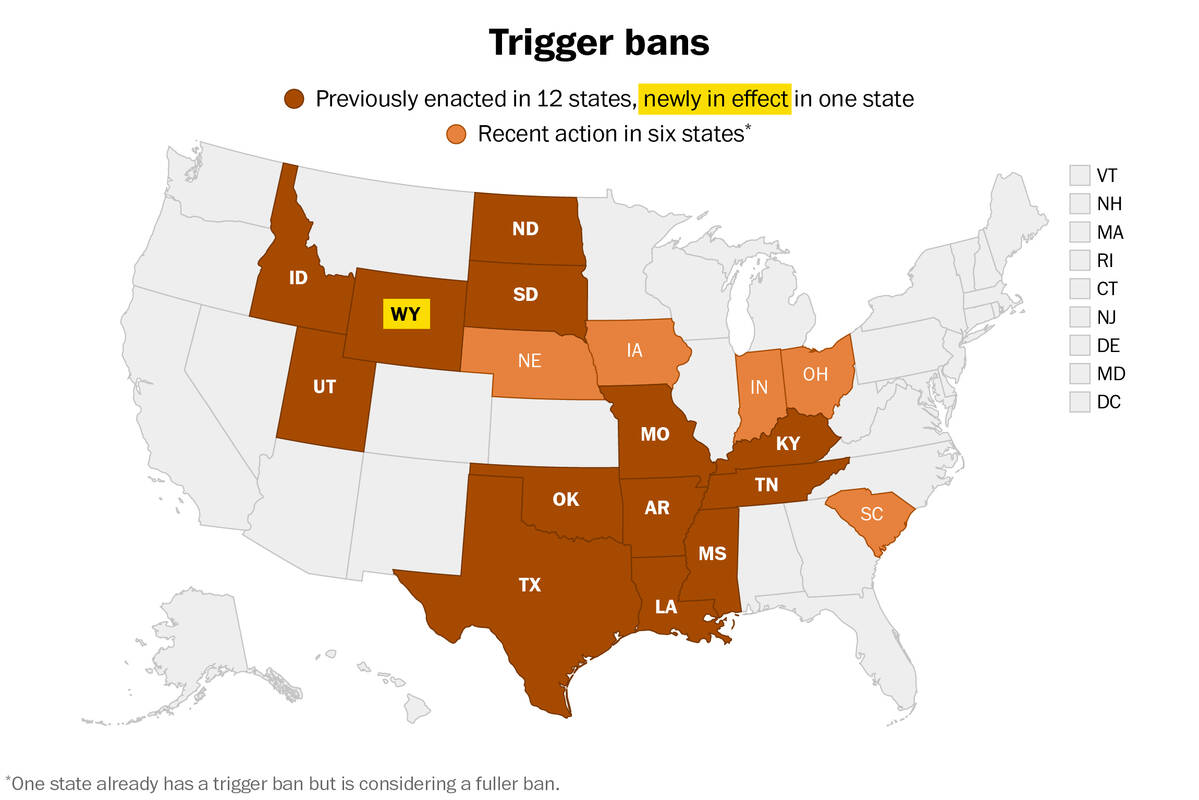
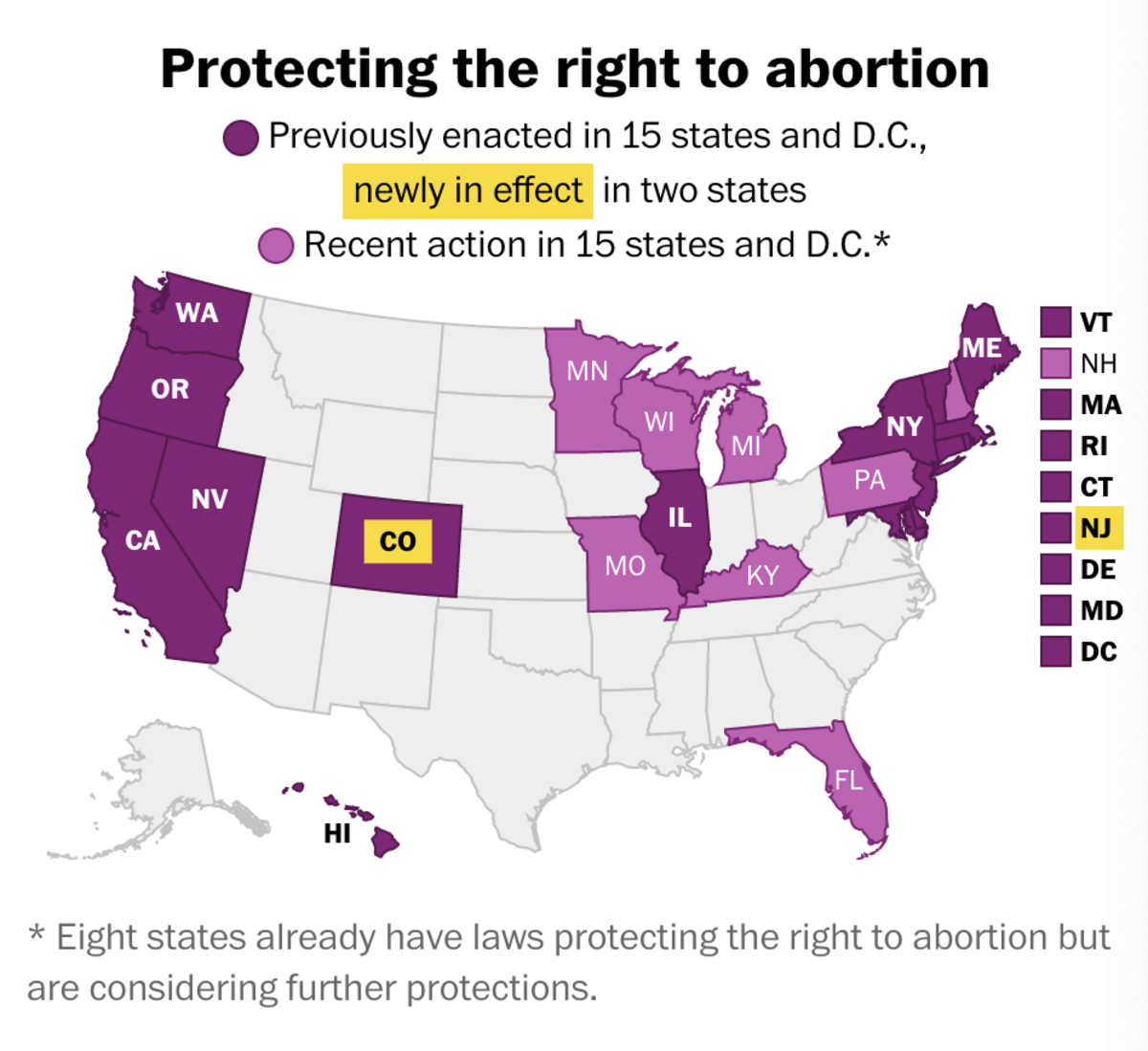



No comments:
Post a Comment